
International Relations of the Asia-Pacific
Scope & Guideline
Illuminating the Forces Shaping the Asia-Pacific Landscape
Introduction
Aims and Scopes
- Regional Security Dynamics:
The journal focuses extensively on security issues, including military cooperation, defense strategies, and the implications of power shifts within the Asia-Pacific. It examines how states navigate security dilemmas and engage in conflict management. - Great Power Rivalry:
A significant area of interest is the competition between major powers, particularly the United States and China. The journal publishes analyses of how this rivalry affects regional relationships and influences the policies of smaller states. - Economic Interdependence and Cooperation:
The journal addresses themes of economic cooperation, trade dynamics, and the impact of globalization on regional economies. It explores how economic ties shape political relationships and influence international policy. - Institutional Development and Governance:
The role of formal institutions and regime complexities in the Asia-Pacific is a key focus, with investigations into how these institutions facilitate cooperation or exacerbate tensions among states. - Historical Context and Cultural Factors:
The journal emphasizes the importance of historical narratives and cultural dimensions in shaping contemporary international relations. It provides insights into how history influences state behavior and identity in the region.
Trending and Emerging
- Environmental Cooperation:
Recent publications highlight a growing focus on environmental issues, particularly in the context of climate change and regional cooperation. This reflects an increasing recognition of environmental challenges as critical to international relations. - Middle Power Diplomacy:
There is an emerging interest in the roles of middle powers in navigating great power competition. Scholars are analyzing how countries like Australia, Japan, and South Korea position themselves strategically amid rising tensions. - Technological and Cybersecurity Issues:
As technology becomes a crucial aspect of national security, there is a surge in research on cybersecurity, cyber warfare, and the implications of technological advancements for international relations. - Migration Governance:
Papers exploring the complexities of migration governance in the Asia-Pacific are becoming more frequent, addressing how states manage migration flows and the associated political, economic, and social implications. - Cultural Diplomacy and Soft Power:
Increasing attention is being paid to cultural diplomacy and the use of soft power as tools for influence within the region, reflecting a broader understanding of power beyond military and economic means.
Declining or Waning
- Traditional Military Alliances:
There appears to be a reduced emphasis on traditional military alliances, as newer papers focus more on flexible partnerships and regional security arrangements rather than formal alliances. - Cold War Dynamics:
Research related to Cold War-era geopolitics is less prevalent, indicating a shift towards contemporary issues that resonate more with the current international landscape and evolving power relations. - Static Theoretical Frameworks:
There is a noticeable decline in the application of static or outdated theoretical frameworks in analyzing international relations, as scholars increasingly seek dynamic and context-specific approaches. - Focus on Individual State Policies:
The journal has moved away from papers that solely examine individual state policies in isolation, favoring more integrative analyses that consider regional interdependencies and collaborative frameworks.
Similar Journals

Revista UNISCI
Fostering Innovation in Political Science and International RelationsRevista UNISCI is a distinguished open-access journal published by UNIV COMPLUTENSE MADRID, SERVICIO PUBLICACIONES, dedicated to advancing the discourse in the fields of Political Science and International Relations. Since its inception in 2005, it has established a platform for emerging scholars and seasoned researchers alike to share innovative ideas and findings. With an E-ISSN of 2386-9453, Revista UNISCI is accessible to a global audience, facilitating knowledge dissemination in an increasingly interconnected world. The journal has been categorized in Q4 quartile for 2023, highlighting its relevance in the competitive landscape of academic publishing, while its Scopus rank of 566 out of 706 positions it among the prominent voices in the discipline. As the journal enters its converged years from 2015 to 2024, it aims to foster interdisciplinary dialogue and contribute to ongoing research debates, ultimately enriching the academic community’s understanding of critical global issues.

Asian Perspective
Navigating Complex Social Phenomena in Asia and BeyondAsian Perspective is a distinguished academic journal published by Johns Hopkins University Press, focusing on the interlinked fields of life-span and life-course studies, political science, and international relations, as well as sociology. With a publication history dating back to 1974, the journal not only showcases transformative research but also reflects the dynamic societal shifts occurring across Asia and beyond. Asian Perspective holds a reputable position within its categories, ranking in Q3 for Life-span and Life-course Studies and Q2 for both Political Science and International Relations and Sociology, signifying its essential contribution to these discussions. The journal is indexed with significant merit, including a rank of #260 out of 706 in Political Science and International Relations, demonstrating its scholarly influence and engagement. Though it currently does not offer open access, the journal remains a vital resource for researchers, professionals, and students seeking insight into complex social phenomena and their implications within a global context.
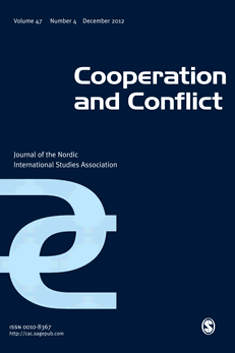
Cooperation and Conflict
Unraveling the Threads of Conflict and CollaborationCooperation and Conflict is a premier academic journal published by SAGE Publications Ltd that serves as a vital platform for research in the fields of development, political science, international relations, and social sciences. With an impressive impact factor and a prestigious Q1 ranking in multiple categories including Political Science and Development, this journal stands out for its rigorous peer-reviewed articles that explore the complexities of conflict and cooperation in various global contexts. Since its inception in 1965, the journal has remained dedicated to advancing scholarly discussion and providing insights into social dynamics, making it an essential resource for researchers, professionals, and students alike. Although it does not offer open access, its significant contributions to the field and high citation rates underscore its importance in understanding and addressing contemporary societal challenges. For those keen to delve into critical discussions and findings that shape our understanding of cooperation and conflict, this journal is an indispensable asset.
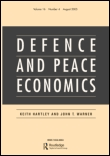
DEFENCE AND PEACE ECONOMICS
Navigating Complexities of Conflict and EconomicsDEFENCE AND PEACE ECONOMICS, published by Taylor & Francis Ltd, stands as a vital interdisciplinary journal dedicated to the exploration of economic principles and policy frameworks within the context of defense and peace studies. With its ISSN 1024-2694 and E-ISSN 1476-8267, this esteemed journal has been contributing to the field since 1994, maintaining a reputation for rigorous academic research evidenced by its Q2 ranking in both Economics and Econometrics and Social Sciences (miscellaneous) categories for 2023. Positioned in the 84th percentile in Social Sciences and 68th percentile in Economics according to Scopus, it serves as a pivotal resource for researchers, policymakers, and educators alike. The journal aims to foster a deeper understanding of the economic dimensions of national security, conflict resolution, and peacebuilding, and it encourages submissions that address contemporary challenges and theoretical advancements in these fields. Although not an open-access journal, its insightful articles are accessible through institutional subscriptions, making them available to a wide audience. DEFENCE AND PEACE ECONOMICS continues to shape discourse and provide critical insights necessary for navigating the complexities of global security and economic interplay.
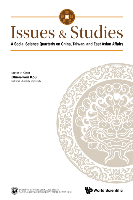
ISSUES & STUDIES
Bridging Theory and Practice in Global AffairsISSUES & STUDIES is a prestigious academic journal published by World Scientific Publishing Company, specializing in the fields of Political Science and International Relations, as well as Sociology. With a distinguished publication history since its inception in 1972, the journal has consistently aimed to disseminate high-quality research and insightful analyses that inform and inspire discussions in relevant scholarly communities. Currently housed in Taiwan, it enjoys a notable impact, categorized in the Q2 quartile across its disciplines, reflecting its significant contribution to ongoing academic discourse. The journal is indexed by Scopus and holds respectable rankings in both Political Science and Sociology, underlining its role as a vital resource for researchers, professionals, and students alike. Engaging with ISSUES & STUDIES offers a unique opportunity to explore contemporary and historical issues through a scholarly lens, promoting a deeper understanding of complex socio-political dynamics.

Contemporary Europe-Sovremennaya Evropa
Fostering Dialogue on European Political and Economic IssuesContemporary Europe-Sovremennaya Evropa is a leading academic journal published by ROSSIIKAYA AKAD NAUK, INST EVROPY that delves into the intricacies of European political, economic, and social landscapes. With an ISSN of 0201-7083, this journal caters to an essential niche within Social Sciences, particularly focusing on Political Science and Economics. The journal holds a commendable Q3 ranking in both Economics and Econometrics and Political Science and International Relations, reflecting its commitment to disseminating high-quality research relevant to contemporary challenges in Europe. As part of its mission, Contemporary Europe seeks to provide scholars, practitioners, and policy-makers with empirical insights and theoretical frameworks that enhance understanding and foster dialogue in a rapidly evolving geopolitical landscape. Although currently not categorized as Open Access, the journal continues to strive for broader academic reach and accessibility. With a convergence of content from 2016 to 2024, it addresses pressing issues and trends, establishing itself as a valuable resource for those interested in European studies.

Korea Observer
Fostering Scholarly Dialogue on Korea's Global InfluenceKorea Observer, published by the Institute of Korean Studies, is a leading academic journal that provides a critical platform for the exploration and discussion of various aspects of Korean studies. With an ISSN of 0023-3919, this journal has been an invaluable resource for researchers, professionals, and students interested in the social sciences and humanities pertaining to Korea, maintaining a consistent publication record from 2007 to 2024. As of 2023, it holds a respectable Q3 category ranking in both the Arts and Humanities and Social Sciences fields, showcasing its ongoing commitment to excellence in scholarly communication. While the journal primarily focuses on advancing the understanding of Korean culture, society, and politics, it also serves as a vital conduit for interdisciplinary insights that resonate with global academic discourses. Located in South Korea, this journal does not currently offer open access, making it essential for subscribers and institutional access for the latest research and discussions in the field. With a Scopus rank placing it favorably within its categories, the Korea Observer remains an essential tool for enriching the body of knowledge surrounding Korea and its global impact.
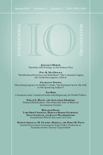
INTERNATIONAL ORGANIZATION
Championing Critical Research in a Changing WorldINTERNATIONAL ORGANIZATION, a prestigious journal published by Cambridge University Press, stands at the forefront of political science, law, organizational behavior, and sociology. Since its inception in 1947, this influential journal has fostered critical dialogue and research among scholars and practitioners, maintaining an impressive impact in the field, as evidenced by its Q1 rankings across multiple disciplines in 2023. With a robust Scopus rank placing it in the top percentiles of its categories, INTERNATIONAL ORGANIZATION serves as an essential resource for those engaged in understanding complex global issues, institutional frameworks, and human resource dynamics. Although it does not offer Open Access, it provides extensive insights that are invaluable for students, researchers, and professionals dedicated to advancing knowledge in international relations and organizational studies. For those looking to contribute to impactful scholarship, submissions to this journal provide a unique opportunity to influence the evolving landscape of these critical fields.
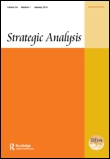
Strategic Analysis
Exploring the intersection of politics and safety.Strategic Analysis is a prominent academic journal published by Routledge Journals, Taylor & Francis Ltd, focusing on the critical fields of Political Science and International Relations, as well as Safety Research. With an ISSN of 0970-0161 and an E-ISSN of 1754-0054, it stands out as a valuable resource for scholars and professionals interested in strategic studies and related disciplines. The journal's esteemed reputation is highlighted by its placement in Q3 and Q4 categories in the respective fields for 2023, indicating its significant contribution to knowledge and discussion within these domains. Covering a broad timeline with converged years from 1978 to 1984, 1998 to 2004, and now from 2007 to 2024, it provides a platform for innovative research and analytical insights. Readers can benefit from in-depth studies and reviews that address contemporary challenges and strategies in public policy and safety, making it an essential read for researchers, practitioners, and students alike. Although it does not currently offer open access, the journal remains committed to disseminating high-quality research aimed at enhancing strategic frameworks and improving decision-making processes on a global scale.

Croatian International Relations Review
Advancing Knowledge in International Relations.Croatian International Relations Review, published by the Institute for Development of International Relations, serves as a vital platform for scholarly discourse in the fields of political science and international relations. As an Open Access journal since 2013, it aims to enhance accessibility and dissemination of research findings, fostering greater engagement among researchers, practitioners, and students worldwide. Located in Croatia and operating from a vibrant academic hub in Zagreb, this journal contributes significantly to the understanding of contemporary international issues, reflected in its Q3 ranking in 2023 and placement within the 60th percentile of Scopus rankings in its category. With its commitment to high-quality research and diverse methodological approaches, the Croatian International Relations Review is essential for those looking to explore, analyze, and influence the dynamic landscape of global relations.